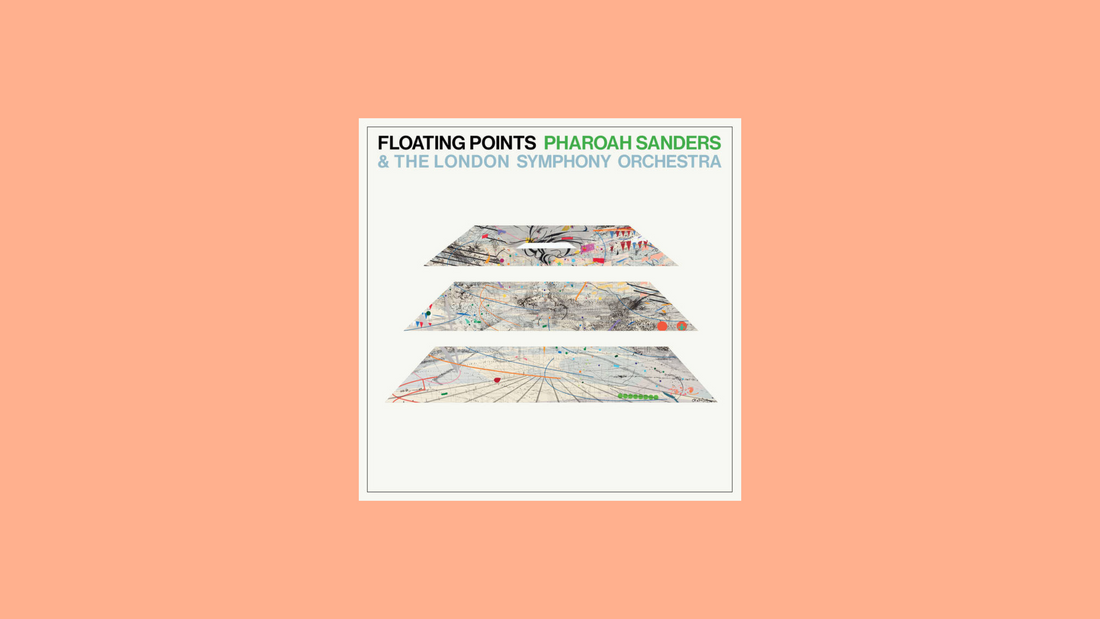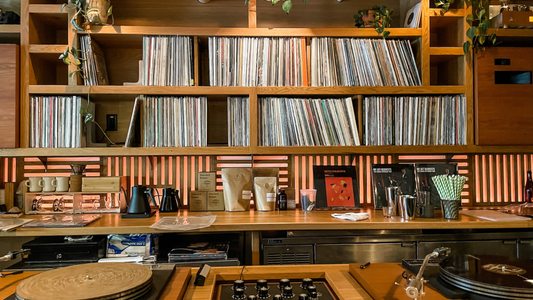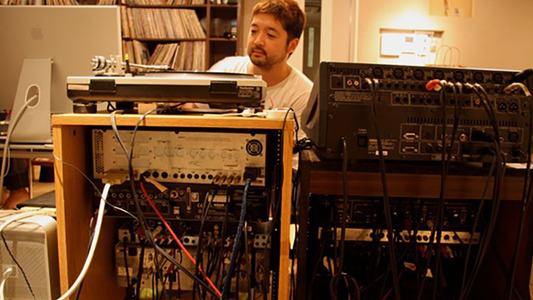
Floating Points, Pharoah Sanders & London Symphony Orchestra – Promises (2021)
By Rafi Mercer
A single motif begins: a seven-note phrase on keyboard, simple and circling, like a thought returning. It repeats, unchanging yet constantly alive, a pattern that becomes both anchor and horizon. Slowly, Pharoah Sanders enters. His saxophone tone — aged, grainy, fragile yet luminous — breathes into the space, rising and falling around the motif. Strings, played by the London Symphony Orchestra, drift in with patience, expanding the sound into something vast. This is Promises, released in 2021, a collaboration between electronic producer Sam Shepherd (Floating Points), the legendary jazz saxophonist Pharoah Sanders, and one of the world’s great orchestras. It is not simply an album but an act of devotion: a single piece of music lasting 46 minutes, designed as a vessel for presence.
The work is divided into nine movements, but the divisions are porous. The seven-note motif, played on Rhodes piano, recurs throughout, sometimes clear, sometimes submerged. Around it, textures shift: Sanders improvises with tenderness and restraint, the orchestra swells and retreats, electronics shimmer like distant light. The piece is less a narrative than a meditation, less a composition than a space to inhabit.
What strikes most is Sanders himself. By 2021, he was in his eighties, long past the firestorms of Karma and Black Unity. His sound here is different — softer, slower, each note considered. He growls occasionally, but more often he lingers, caresses, exhales. There is wisdom in the fragility, beauty in the restraint. Every phrase feels like offering, like prayer.
Floating Points provides the framework. His seven-note motif is austere, almost minimalist, but its constancy allows space for everything else. Electronics appear subtly: drones, shimmering tones, pulses that feel more like atmosphere than rhythm. The London Symphony Orchestra adds scale: swelling chords, luminous textures, grandeur without excess. Together, the three forces create a piece that feels timeless, borderless, universal.
The album’s centrepiece arrives in movement six, when the orchestra surges to a crescendo of overwhelming beauty. Sanders’ saxophone floats above, fragile yet resolute, before dissolving into silence. The motif returns, unchanged, as if nothing has happened and yet everything has changed. It is one of the most moving passages in recent music, a convergence of age, tradition, innovation, and devotion.
Culturally, Promises was a revelation. In an era of short attention spans and algorithm-driven listening, here was a 46-minute piece demanding patience, immersion, slow listening. Critics hailed it as masterpiece. Audiences, surprisingly, embraced it. It topped charts, won Album of the Year accolades, and introduced Sanders to a new generation who may have known little of his earlier work. It proved that music of depth and duration could still resonate in a distracted age.
For listeners, its inclusivity is striking. You do not need to know Sanders’ history, Floating Points’ electronic credentials, or the LSO’s classical pedigree to feel its power. The motif is simple, the textures immersive, the emotion clear. It is music that welcomes everyone: women and men, seasoned jazz devotees, electronic fans, classical listeners, or newcomers. It does not gatekeep; it opens.
On vinyl, the record is extraordinary. The repetition of the motif across sides makes the act of flipping part of the ritual. The analogue warmth deepens Sanders’ tone, makes the strings shimmer, gives the electronics physical presence. The sleeve — abstract artwork by Julie Mehretu, layered and luminous — mirrors the music’s sense of space and time as fluid.
What endures about Promises is its humility. Despite its grandeur, it is never showy. Despite its collaboration across generations and genres, it is never cluttered. It is patient, generous, sincere. Sanders, at the end of his life, found a new way to testify — not through fire but through breath. Floating Points, at mid-career, offered structure without dominance. The LSO, with centuries of tradition, gave weight without rigidity. Together, they created a work that feels less like an album and more like a gift.
To play Promises today is to step into a space of stillness. The motif repeats. The saxophone sighs. The strings shimmer. You breathe differently. You listen differently. And when it ends, you emerge changed, as if you’ve carried something with you: not just sound, but presence.
Rafi Mercer writes about the spaces where music matters. For more stories from Tracks & Tales, subscribe, or click here to read more.







